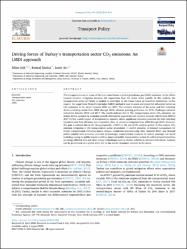| dc.contributor.author | Işık, Mine | en_US |
| dc.contributor.author | Sarıca, Kemal | en_US |
| dc.contributor.author | Ari, İzzet | en_US |
| dc.date.accessioned | 2020-09-07T10:05:07Z | |
| dc.date.available | 2020-09-07T10:05:07Z | |
| dc.date.issued | 2020-08-01 | |
| dc.identifier.citation | Işık, M., Sarıca, K. & Ari, İ. (2020). Driving forces of Turkey's transportation sector CO2 emissions: An LMDI approach. Transport Policy, 97, 210-219. doi:10.1016/j.tranpol.2020.07.006 | en_US |
| dc.identifier.issn | 0967-070X | |
| dc.identifier.issn | 1879-310X | |
| dc.identifier.uri | https://hdl.handle.net/11729/2371 | |
| dc.identifier.uri | http://dx.doi.org/10.1016/j.tranpol.2020.07.006 | |
| dc.description.abstract | The transportation sector is one of the main contributors to global greenhouse gas (GHG) emissions. As the efforts towards emission mitigation increase, the expectation from the sector arises equally. In this analysis, the transportation sector of Turkey is studied to shed light on the future based on historical realizations. In this respect, the Logarithmic Mean Divisia Index (LMDI) method is used to assess and reveal the influential factors on CO2 emissions in the sector between 2000 and 2017. The emission intensity of the sector and fuel switching shows promising trends from 2000 through 2010, whereas growing preference for SUVs challenges emission reductions between 2010 and 2017. The results indicate that i) The transportation sector CO2 emissions are mainly driven upwards by economic growth, followed by population and emission intensity effects from 2000 to 2017 ii) The overall impact of transportation intensity shows significant reduction potential iii) Fuel switching incentives and fleet efficiency have a positive effect on emission mitigation from 2000 through 2010. However, this gain is reduced due to the rising popularity of SUVs in the rest of the analysis period. In this respect, CO2 emission mitigation in the transportation sector necessitates 1) careful planning of demand management for freight transportation including master designs production/manufacturing sites, material flows, and demand points coupled with economic activities 2) passenger transportation measures to reduce passenger car travel including zoning for public transit corridors, improved public transportation system 3) well-structured incentives on energy-efficient cars and clean energy technologies such as electric vehicles to convince individuals. Analysis can be generalized on a global scale due to the similar dynamics inherent in the sector. | en_US |
| dc.language.iso | eng | en_US |
| dc.publisher | Elsevier Ltd | en_US |
| dc.relation.isversionof | 10.1016/j.tranpol.2020.07.006 | |
| dc.rights | info:eu-repo/semantics/closedAccess | en_US |
| dc.subject | CO2 emissions | en_US |
| dc.subject | LMDI | en_US |
| dc.subject | Transportation sector | en_US |
| dc.subject | Carbon dioxide | en_US |
| dc.subject | Carbon emission | en_US |
| dc.subject | Demand analysis | en_US |
| dc.subject | Emission control | en_US |
| dc.subject | Emission inventory | en_US |
| dc.subject | Freight transport | en_US |
| dc.subject | Mitigation | en_US |
| dc.subject | Traffic emission | en_US |
| dc.subject | Traffic management | en_US |
| dc.subject | Transportation planning | en_US |
| dc.subject | Turkey | en_US |
| dc.subject | Carbon-dioxide emissions | en_US |
| dc.subject | Decomposition analysis | en_US |
| dc.subject | Energy-consumpion | en_US |
| dc.subject | Renewable energy | en_US |
| dc.subject | China | en_US |
| dc.subject | Intensity | en_US |
| dc.subject | Europe | en_US |
| dc.title | Driving forces of Turkey's transportation sector CO2 emissions: An LMDI approach | en_US |
| dc.type | article | en_US |
| dc.description.version | Publisher's Version | en_US |
| dc.relation.journal | Transport Policy | en_US |
| dc.contributor.department | Işık Üniversitesi, Mühendislik Fakültesi, Endüstri Mühendisliği Bölümü | en_US |
| dc.contributor.department | Işık University, Faculty of Engineering, Department of Industrial Engineering | en_US |
| dc.contributor.authorID | 0000-0001-7277-3764 | |
| dc.identifier.volume | 97 | |
| dc.identifier.startpage | 210 | |
| dc.identifier.endpage | 219 | |
| dc.peerreviewed | Yes | en_US |
| dc.publicationstatus | Published | en_US |
| dc.relation.publicationcategory | Makale - Uluslararası Hakemli Dergi - Kurum Öğretim Elemanı | en_US |
| dc.contributor.institutionauthor | Sarıca, Kemal | en_US |
| dc.relation.index | WOS | en_US |
| dc.relation.index | Scopus | en_US |
| dc.relation.index | Social Sciences Citation Index (SSCI) | en_US |
| dc.description.quality | Q1 | |
| dc.description.wosid | WOS:000573049500003 | |



















